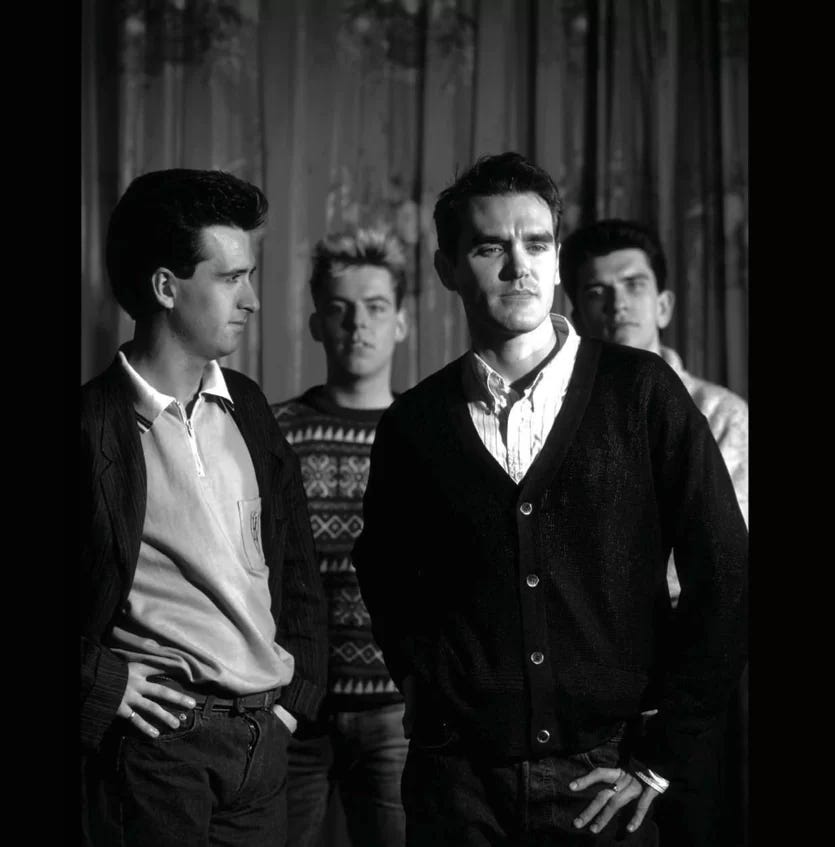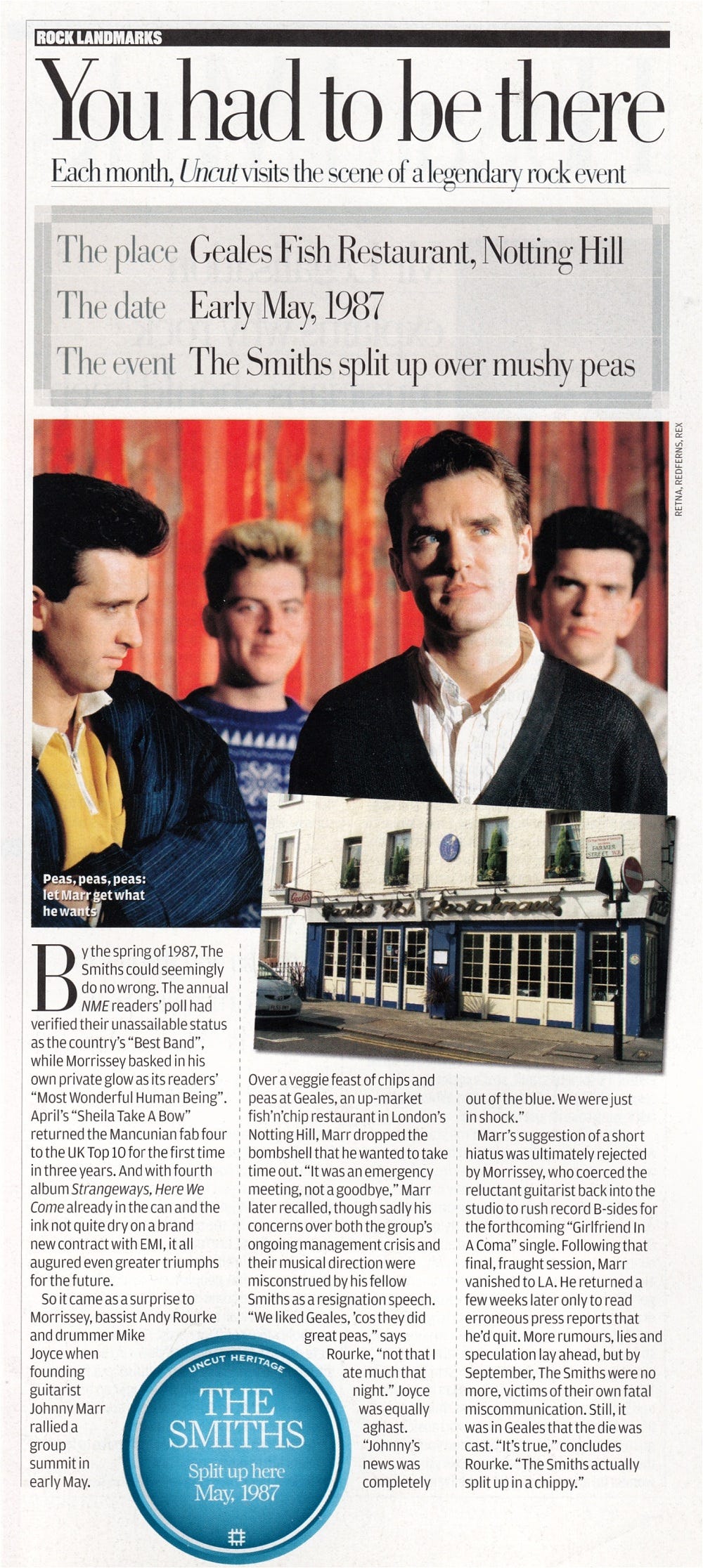May 1987 at Firehouse Studios, Streatham (London):
“…Mike [Joyce] came up to me and said, ‘We’re doing a cover version. It’s a Cilla Black song.’ I thought he was joking, but I looked at the others and realised he was serious. I didn’t want to do a cover of a Cilla Black song, and I didn’t want to be told I was doing one by Mike either. That was not going to be the new way. I was becoming angry. My dedication to the band was being tested, which was hard to take as I’d formed the band in the first place. I relented and listened to the Cilla Black song. It was a silly bit of Merseybeat called ‘Work Is a Four-Letter Word’, with lyrics that said, you were born lazy and change your life. We recorded it, and when it was finished I thought it wasn’t even worthy of being associated with The Smiths. The oppressive feeling affected the sessions every day. We all needed to take a break from one another, and the stress was being expressed in desperation and mistrust. The more weird everything got, the more I wanted to get out, and the more I wanted to get out, the more tense the feeling became between everyone.”1 [Emphasis added] - Johnny Marr
Just days prior to the aforementioned recording of ‘Work Is A Four Letter Word’ (along with ‘I Keep Mine Hidden’) at Firehouse Studios, Johnny Marr had called his colleagues together for a band meeting at an upscale chippie called Geales in Notting Hill, London. Marr informed his gathered bandmates that he needed to take a break, citing the group’s ongoing management problems as well as the musical direction of the Smiths (among other things):
“I told the band that we needed to have a rethink and get some perspective. I was trying to shake off the malaise that was taking over us, and I talked vaguely about reinventing the music, although I wasn’t sure what that meant. I knew that the others no longer considered Ken Friedman2 to be the manager and I didn’t have a solution to that. I expressed my frustrations as well as I could without trying to sound too negative, but inside I felt like I was drowning.”
According to Mike Joyce, Marr’s revelations were “…completely out of the blue. We were just in shock.”
In retrospect, it was inopportune for Marr to also inform his colleagues in this very same meeting that he planned on working with other artists. Marr’s revelation that he had been invited to play on the Talking Heads’ new album (which, coincidentally, was being produced by Steve Lillywhite) as well as that Bryan Ferry had asked him to assist in the promotion of ‘The Right Stuff’ (a song that the latter had adapted from the Smiths’ ‘Money Changes Everything’, which was to be the first single off of Ferry’s upcoming Bête Noire studio album) was met with stunned silence.
Whether or not Marr had merely wished to take a temporary break, it is not unreasonable that Morrissey et al perceived the totality of these disclosures in a different light.
According to Marr:
“The band’s response was unenthusiastic and unfriendly, and again it looked as though I was in a minority of one. They’d already been discussing what they wanted to do, and now Mike appeared to be the new spokesman. He informed me that the band intended to go back into the studio to record new songs, which I thought was a bizarre suggestion. We’d only just completed a new album that wasn’t due out for months. I was about to go on holiday, and now I was being told to go back into the studio, and with no songs. It was like a weird test, and I was guilty of some kind of violation. The mood stayed frozen. They obviously had a problem but I didn’t know what it was. I loved the others and I wanted everything to be all right, but I was aware of a new dynamic that had developed in the band, and I felt like I was being made to submit.”
While the group’s response to Marr might appear on its face as something less than constructive, it is worth considering that it may have been more an act of quiet desperation to retain their beloved Johnny, who appeared to be slipping away from them. Morrissey opting to press forward - going so far as to instruct Joyce to inform Marr (which was likely a conciliatory gesture) that the group needed him in the studio for yet another recording session - was almost certainly meant to salvage the crumbling cohesion of the Smiths. Unfortunately, this was a critical miscalculation on Morrissey’s part as it merely deepened the disquiet that Marr was experiencing:
“We had reached an impasse; a chasm had opened up between us and there was no way to bridge it […] I agreed to go back into the studio to please everyone […] The day after the sessions ended I went to the airport in a daze after working all through the night. Angie and I got on the plane, and as we took off I felt an incredible sense of relief. Getting out into the sunshine was exactly what I needed. I hung around for a couple of days doing very little; it was nice not having to be anywhere for a while. I was still shell-shocked from the events of the previous few weeks. Things had reached breaking point and I thought a lot about the new divisions in the band. I waited for one of the others to call but there was nothing, and the more days that went by without hearing anything, the more it pissed me off and the more I started to think that The Smiths might actually be over."
Morrissey’s recollection of events is in some ways similar to Marr’s insofar as the need to take a break; however, he seems to conveniently leave out most of what the latter has said on the subject:
“…here we are - wanting to live yet longing for sleep. Johnny and I were both drained beyond belief, and there was no one around us to suggest that we disappear somewhere to rest, and apart. We do not telephone each other for two weeks, and then suddenly the press is rife with Smiths split stories of bitter feuds during catty sessions for Strangeways, Here We Come.”3
To be continued…
All Johnny Marr quotes in this post are from his autobiography, Set The Boy Free (November 2016)
Ken Friedman was the Smiths’ short-lived final manager before they dissolved. Marr brought Friedman in to alleviate his having the manage the day-to-day of the Smiths’ business affairs so that he could focus on the music. According to author Simon Goddard, Morrissey didn’t like Friedman and all but rejected his involvement, which was a contributing factor in Marr’s decision to seek a temporary hiatus from the group.
Autobiography




